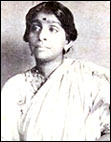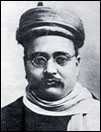|
She was sent to Cambridge because at 14 she loved a man outside her caste. There, she devoted more time to poetry than her studies. It was just a matter of time before she was overwhelmed by the most dominant event of her time: The struggle for Independence.

Sarojini Naidu was among the most visible leaders of pre-Independent India. President of the Indian National Congress and the first woman governor of free India, she was a passionate advocate for India, avidly mobilising support for Indian Independence abroad.
During those long years in pursuit of freedom, Sarojini Naidu corresponded with many of India's greatest figures ... Gopal Krishna Gokhale, Mahatma Gandhi, Jawaharlal Nehru, Rabindranath Tagore among others. The letters that follow provide more than ample insight into the minds of these great men and women and, of course, those turbulent times.

'We want a new breed of men before
India can be cleansed of her disease'
Hyderabad, Deccan
24 December 1914
Dear Mr Gokhale
I have no news of or from you for some time now and
in spite of my own stern and unselfish prohibition to you, feel
both aggrieved and anxious at your silence. I hope it means that
you are so much better that you have no time to write instead
of so much worse that you have not the strength!, in which case
of course the illness would have been blazoned abroad with the
true journalistic flair for 'personal items' concerning the
Great Ones of the earth.
I should have written myself but my own health is
in a most unsatisfactory condition: daily attacks of fever and
perennial attacks of people! - both of which in their excess play
havoc as you know with one's time and temper, not to speak of
one's constitution. I don't seem to see any very successful remedies
against the onslaught of both men and mosquitoes for some time
to come. Both have one thing in common: they can sting: but fortunately
that species of men that approximates to the local mosquito I
have left behind to poison the air of London - perhaps next week
of Madras! (That is malicious of me but true!)
Here the men are ([illegible] in its vague sense)
strange as it may sound of Hyderabad!, decent and kind only: they
live and let live. I wonder if it is because they have no ambitions
to be Leaders - 'Our Leaders' as my boys ironically call
them. Now laugh: relax your solemn brain and laugh - whole heartedly
as I do at the mosquito - like, malarial, malicious men who disturbed your peace, not long ago!
Oh, we want a new breed of men before India can be
cleansed of her disease. We want deeper sincerity of motive, a
greater courage in speech and earnestness in action. We want men
who love this country and are full of yearning to serve and succour
their brothers and not to further aid in their degradation by
insincerity and self-seeking. O how I hate shams and prejudices:
how I hate all sectarian narrowness, all provincial limitations
of vision and purpose, all the arrogant sophistries of man-made
divisions and differences: how tired I am to death of the reiterated
resolutions that have become almost meaningless by lip repetition:
uncorroborated by the heart's conviction and unsustained by practical
action - all this stirs me more deeply just now because of the
coming national week. What a week of inspiration it should be
to all partaking in the various activities, if only all those
activities could be so co-ordinated and realised as intrinsic
parts of the same many-sided work of progress: the radii of one
unshifting centre.
One needs a Seer's Vision and an Angel's voice to
be of any avail. I do not know of any Indian man or woman today
who has those gifts in their most complete measure.
I was to have gone to Madras: or rather they made
up their minds at the various conference committees that must
speak, and I would gladly have done so, striking in my own way,
humbly and sincerely, the very note of co-ordination, buy my health
makes it impossible (and not safe) for me to face the exertions
and excitements of so many activities. But I do not regret my
inability to be present at the conferences half so much as my
inability to accept the invitation - how cordial, how touching
and how generous [?] of the student world who were hoping to organise
all sorts of things in my honour. The students and the women of
Madras: the two sections of the nation which are to be my special
concern in all my future work.
I am afraid your absence again this year from the
Congress will be a source of great disappointment and rob of it
much of its dignity and authority. But your health is of far more
urgent importance than even the Congress.
When do you go to Delhi: will it not be too severe
a climate for your health? Are you taking your own doctor with
you? And does he think you are really well enough to face such
an ordeal of work and weather?
Please write to me or ask one of your chelas to send
me a line before you leave for Delhi.
My husband is exceedingly busy. For some time the
talk of his going had been slack, but just now again there seems
to be a move to get him sent to the front! I suppose he would
have to go as some General's staff. Meanwhile I fear my health
causes him more anxiety than a whole field hospital full of (the)
wounded is likely to cause him! He sends you or rather entrusted
me sometime ago with a message for your of most anxious good wishes
for your speedy recovery. My children send you their respects.
They think you must be a phenomenally wise and venerable person
because I always speak of you with so much, shall I say respect
or shall I say affection? Perhaps both would be true: but that
does not prevent me from taking you to task when you are unwise
and unvenerable enough to do foolish things that hurt your health.
I am always guilty of such folly, but my children never suffered
from any illusion about my wisdom and venerable qualities: I am
their Pal and Comrade and fellow sinner in all things human and
delightful.
Remember me to your daughter and to your sister also.
And send me a potent Brahminical charm against the ills of flesh -- and
the wars of my spirit!
Your affectionately,
Sarojini Naidu
A letter to Bapu
Excerpted from Sarojini Naidu: Selected Letters 1890s to 1940s, selected and edited by Makrand Paranjape, Kali for Women, 1996, Rs 400, with the publisher's permission. Readers interested in buying a copy of the
book may write to Kali for Women, B 1/8 Hauz Khas, New Delhi - 110 016.
|

